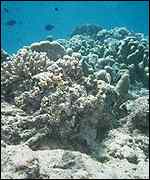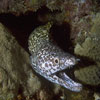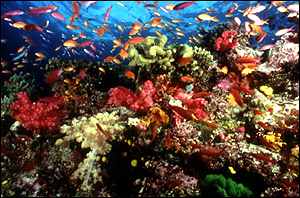Ten richest coral areas pinpointed
 |
By
Alex Kirby
BBC
News Online environment correspondent
|
 |
Scientists have listed the world's 10 most important coral reef
areas for the first time.
Each is home to a wide range of endemic species (those with
a restricted range).
The scientists say their work should help to target conservation
work more successfully. But they say 25% of the world's reefs
have already been destroyed or badly damaged by problems arising
from climate change.
They say 58% of reefs are reported to be threatened by human
activities.
The scientists have published their findings in the journal
Science and are reporting them to the annual meeting of the
American Association for the Advancement of Science in Boston,
US.
Mapping
the impacts
The 10 hotspots, according to the degree of threat they face,
are the Philippines; gulf of Guinea; Sunda islands (Indonesia);
southern Mascarene islands (near Madagascar); eastern South
Africa; northern Indian ocean; southern Japan, Taiwan and
southern China; Cape Verde islands; western Caribbean; and
the Red sea and gulf of Aden.

Dying
reef: Many are at risk (Lauretta Burke)
|
The researchers identified the 10 areas by mapping the geographic
ranges of 1,700 species of reef fish, 804 corals, 662 snails
and 69 lobster species.
They then compared these with known threats to coral reefs
from human impacts. The 10 areas contain 24% of the world's
reefs, but 34% of endemic species.
Threats include farming, deforestation and development, which
can leave the reefs struggling against sediments, nutrients
and other pollution.
Intensive fishing, sometimes with dynamite and poison, is
also devastating.
The authors write: "Marine species have long been considered
resilient to extinction because of their large geographic
range sizes.
"Widespread
reef degradation could lead to a gathering wave of extinctions.
"Many
centres of endemism are deeply at risk and can be considered
analogous to terrestrial biodiversity hotspots.
"Without
rapid conservation action, species will be lost."
The scientists say concentrating conservation on the hotspots
could be highly effective, but it should extend to reef "wilderness"
areas "and must include efforts to mitigate climate change".
Setting
limits
The lead author of the report is Dr Callum Roberts, of the
University of York, UK.
He said: "We know that unless we take action right away, marine
species will start going extinct.
"This
study can help us create an urgently needed strategy that
targets the places where biodiversity is bleeding away most
rapidly."
Dr Roberts said marine reserves out of bounds to fishing were
needed immediately. They would be economically beneficial
as well as effective, he said.

Hotspots
are special but all reefs need help (Willis Greiner)
|
The research was funded by Conservation International, and Unep-WCMC
(the United Nations Environment Programme World Conservation
Monitoring Centre) provided data.
The lead author of Unep-WCMC's World Atlas of Coral Reefs,
published in 2001, is Dr Mark Spalding.
He told BBC News Online: "This research is critical for helping
us to focus on the threats, but we mustn't forget what's not
in the hotspots.
Threat
increased
"It's
shown us that the unique reef populations and habitats are
scattered across the globe.
"It's
also shown us that an assessment of the world's reefs we did
in 1998 was over-optimistic.
"Three
of the 10 hotspots are in south-east Asia. But the World Resources
Institute (WRI) has just published a report showing that 88%
of the region's reefs are severely threatened by human activities."
South-east Asia contains one-third of the world's reefs. The
main threats are over-fishing, fishing using destructive methods,
and the spread of sediment and pollution from the land.
The WRI report is entitled Reefs at Risk: South-east Asia.
reprinted
from the bbc web site, 2/14/2002 -- 





